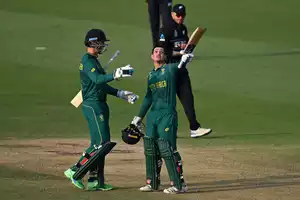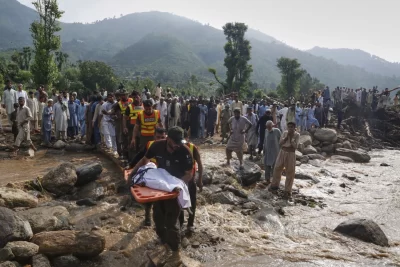
This is getting…not silly, old, or boring. Maybe familiar. Predictable, even. South Africa bat first and add a small mountain of runs to the men’s World Cup landscape, with the help of one, two or even three centuries. News at 11. By which time they have wrapped up another win.
Names and places are changed, not to protect the innocent but to offer further evidence that this South Africa team are different from those who have come and gone before. Now, seven matches into their campaign with just one of them lost – batting second, it bears pointing out – only a fool would say they aren’t bound for the semifinals.
On Wednesday in Pune it was New Zealand’s turn. Actually make that in Pimpri-Chinchwad. Or was it in Gahunje? What cricket calls Pune seems to be a loosely connected string of educational institutions – “the Oxford of the East” – military bases – passengers arriving at the airport are warned it is forbidden to take photographs there – high-rise apartment buildings – some completed, others not – the skeletal beginnings of what will be a metro system, and the Maharashtra Cricket Association Stadium. Much of all that is more or less connected by the Mumbai-Pune Expressway, which morphs the Pune-Bengaluru Road, and its clogged tributaries.
As a metaphor for the nebulousness of New Zealand’s performance, that will have to do. First Tom Latham made the strange decision to field – against a side who had reeled off seven totals above 300 in the last seven ODIs in which they have batted first. Make that eight after Wednesday.
Maybe the Kiwis were emboldened by their 383/9 against Australia in their last match, at the same ground on Saturday. Maybe they forgot that the Aussies had put up 388 to start with. And that the South Africans had rolled Australia for 177 in Lucknow on October 12 to win by 134 runs.
Maybe matters would have unfolded differently had Matt Henry not left the field with a hamstring injury midway through his sixth over. On his way past the dugout and out of the ground to have his leg scanned, Henry passed Lockie Ferguson, Mark Chapman and Kane Williamson, all of them ruled out of the match with various temporary impairments. When Ish Sodhi was called onto the field while Jimmy Neesham went off to have his wrist looked at after Rassie van der Dussen nailed it with a straight drive – which was also a spilled chance – New Zealand were down to their last 11 fit and eligible players.
Perhaps the New Zealanders figured South Africa’s 357/4, replete with Quinton de Kock’s 114 and Van der Dussen’s 133, was chaseable. Even against some of the leading bowlers in the tournament – Marco Jansen, Gerald Coetzee and Kagiso Rabada are among the top 10 wicket-takers.
Maybe the target could have been hauled in, but not after New Zealand had shambled to 90/5 inside 19 overs. Two overs earlier, as Kagiso Rabada prepared to bowl his fifth, the raucous joy of Waka Waka, the Afrofusion-Soca song by Shakira and Freshlyground that was the official anthem of football’s 2010 World Cup in South Africa, boomed from the stadium’s speakers. It was a sign, surely.
Another came after Glenn Phillips deployed silky timing to stroke the first delivery of that over through the covers for four. That wasn’t the sign. Instead it was that the shot, one of the match’s finest, made no impression on the South Africans. Rabada turned on his heel as the ball was fetched from the boundary, and eight overs later New Zealand were 110/8 on their way to 167 all out in 35.3.
South Africa’s sixth win in seven games was achieved with what looked like ridiculous ease. De Kock and Van der Dussen battered the bowling ruthlessly to share 200 off 189 for the second wicket. Keshav Maharaj found sharp turn and bounce to tear through the middle order for his 4/46, after Jansen led a typically ominous assault by the fast bowlers. And that against opponents who had won four of their first six matches and also had two bowlers in the top 10 wicket-takers, along with two of the leading 10 run-scorers.
It wasn’t easy, of course. Displays as dominant as South Africa’s on Wednesday are never a mistake. They are the product of planning and intent, and most importantly execution. There have been times they have failed to do the latter during this tournament, most memorably against the Dutch in Dharamsala on October 17, when they lost by 38 runs. Then they got out of jail to beat Pakistan by one wicket in Chennai on Friday.
But, in light of Wednesday’s walloping, those look like speed bumps on South Africa’s way to the semifinals. Only one team, surely, can beat them before the World Cup reaches its sharp end. They will meet that side in Kolkata on Sunday.
Previously South Africa would have quietly quaked in their boots at the prospect of facing unbeaten India at a packed Eden Gardens, and on Virat Kohli’s birthday, no less. Now, Temba Bavuma’s men might well buy him a cake.







